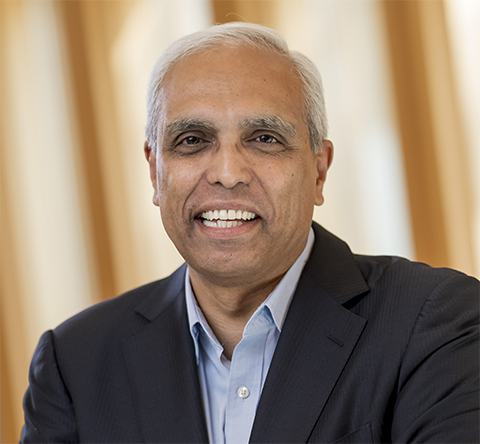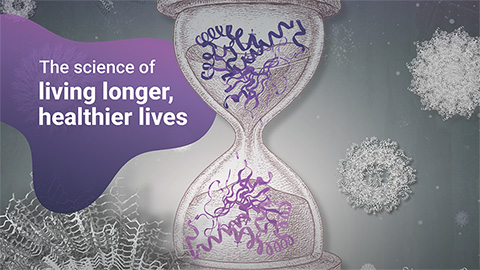
Computational biosciences illuminate how molecular condensates form
When Rohit Pappu was a postdoctoral fellow at Johns Hopkins University working on protein folding, he had a conversation with Keith Dunker, a pioneer in the field of intrinsically disordered proteins, or IDPs. Dunker then shared a paper with him.
“I read that through the night,” Pappu said.

He realized that there might be a different way to think about IDPs — not just from a sequence analysis perspective, but also from a biophysical point of view.
After he set up his own lab at Washington University in St. Louis, Pappu started working on IDPs by combining atomistic and coarse-grained simulations with polymer physics principles to develop models that quantitatively describe their sequence–ensemble relationships.
The work in his lab has led to development of computational engines such as CAMPARI, LaSSI and CIDER. These are used to generate insights regarding the conformational ensembles, (CAMPARI), phase behaviors (LaSSI) and compositional biases as well as non-random sequence features of IDPs (CIDER). Insights and results from biophysical and informatics computations enable quantitative predictions that are testable using experiments, making these tools useful for the IDP and phase separation community and for noncomputational scientists.
Over the past two decades, Pappu’s work has been at the cornerstone of understanding function and phase behaviors of IDPs, and he will receive the American Society for Biochemistry and Molecular Biology’s 2025 DeLano Award for Computational Biosciences. Tanja Mittag and Alex Holehouse nominated Pappu for the award.
“The generality of conclusions borne from LaSSI simulations is a testament to the creativity of Prof. Pappu’s research program,” Mittag and Holehouse wrote in their nomination letter. “(T)he conceptual and computational ecosystem Prof. Pappu has developed over the course of his career has had a profound impact on the field of IDPs and biological phase separation.”
Decoding phases
Cells consist of compartments with distinct functions. However, some compartments lack a membrane, and they form reversibly via phase separation. Phase separation, which is driven by the poor solubility of macromolecules and the associations afforded by multivalent interactions, enables specific molecules to concentrate into specific localities within a cell. The bodies that form as the result of phase separation are known as biomolecular condensates.
In his studies, Rohit Pappu tries to predict and model the phase behaviors of biomolecules that include IDPs, nucleic acids and proteins that feature disordered regions and folded domains. This research also focuses on understanding the driving forces behind the formation of condensates. The foundational studies of what determines how condensates form have a direct impact on understanding how condensates contribute to neurodegenerative diseases and cancers.
Pappu’s computational approaches provide a platform for understanding how physical chemistry principles contribute to cellular localization and the makeup of condensates. These approaches, combined with experiments, help us better understand the microenvironments and players involved in creating molecular condensates.
Rohit Pappu will give a talk titled “Phase separation in cells: Insights from biophysical computations” at the 2025 ASBMB Annual Meeting, April 12–15 in Chicago.
ASBMB 2025 award winners
Read profiles of all the society’s 2025 honorees who will receive their awards and give talks at the ASBMB Annual Meeting, April 12–15 in Chicago.
From receptor research to cancer drug development: The impact of RTKs
Joseph Schlessinger receives the ASBMB Herbert Tabor Research Award.
Computational and biophysical approaches to disordered proteins
Rohit Pappu receives the DeLano Award for Computational Biosciences.
Leading the charge for gender equity
Nicole Woitowich receives the ASBMB Emerging Leadership Award.
Helping underrepresented scientists feel seen
Benjamin Garcia receives the ASBMB Ruth Kirschstein Diversity in Science Award.
Transforming learning through innovation and collaboration
Neena Grover receives the William C. Rose Award for Exemplary Contributions to Education.
Curiosity turned a dietitian into a lipid scientist
Judy Storch receives the Avanti Award in Lipids.
Elucidating how chemotherapy induces neurotoxicity
Andre Nussenzweig receives the Bert and Natalie Vallee Award.
What seems dead may not be dead
Vincent Tagliabracci receives the Earl and Thressa Stadtman Distinguished Scientist Award.
'You can't afford to be 15 years behind the parasite'
David Fidock receives the Alice and C.C. Wang Award in Molecular Parasitology.
Guiding grocery carts to shape healthy habits
Robert Helsley receives the Walter A. Shaw Young Investigator in Lipid Research Award.
Enjoy reading ASBMB Today?
Become a member to receive the print edition four times a year and the digital edition monthly.
Learn moreGet the latest from ASBMB Today
Enter your email address, and we’ll send you a weekly email with recent articles, interviews and more.
Latest in People
People highlights or most popular articles

From humble beginnings to unlocking lysosomal secrets
Monther Abu–Remaileh will receive the ASBMB’s 2026 Walter A. Shaw Young Investigator Award in Lipid Research at the ASBMB Annual Meeting, March 7-10 in Washington, D.C.

Chemistry meets biology to thwart parasites
Margaret Phillips will receive the Alice and C. C. Wang Award in Molecular Parasitology at the ASBMB Annual Meeting, March 7-10 in Washington, D.C.

ASBMB announces 2026 JBC/Tabor awardees
The seven awardees are first authors of outstanding papers published in 2025 in the Journal of Biological Chemistry.

Decoding how bacteria flip host’s molecular switches
Kim Orth will receive the Earl and Thressa Stadtman Distinguished Scientists Award at the ASBMB Annual Meeting, March 7–10, just outside of Washington, D.C.

Thiam elected to EMBO
He was recognized during the EMBO Members’ Meeting in Heidelberg, Germany, in October.

The timekeepers of proteostasis
Learn about the cover of the winter 2026 ASBMB Today issue, illustrated by ASBMB member Megan Mitchem.

